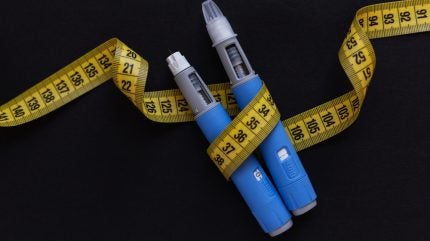
UK drug regulators have shut down an illicit manufacturing facility producing counterfeit glucagon-like peptide-1 receptor agonist (GLP1-RA) medications in the East Midlands.
This follows a raid from the law enforcement unit of the Medicines and Healthcare products Regulatory Agency (MHRA), which seized 2,000 unlicensed weight loss pens ready for shipping.

Discover B2B Marketing That Performs
Combine business intelligence and editorial excellence to reach engaged professionals across 36 leading media platforms.
The Northampton-based manufacturing site was producing counterfeit versions of Eli Lilly’s top-selling obesity medication, Zepbound (tirzepatide).
Unlicensed pens containing Eli Lilly’s investigational GLP-1RA, retatrutide, were also found on the premises. The compound, which is currently in Phase III trials for obesity with comorbid knee osteoarthritis, has not received approval from any regulatory body worldwide.
Alongside finished products, “sophisticated” manufacturing and packing equipment was also found at the site, as well as tens of thousands of autoinjectors ready to be filled.
According to the MHRA, this is the largest single seizure of trafficked weight loss medications in recorded history.

US Tariffs are shifting - will you react or anticipate?
Don’t let policy changes catch you off guard. Stay proactive with real-time data and expert analysis.
By GlobalDataGlobal health authorities warn against counterfeit GLP-1RAs
While this is the first illicit production facility to be uncovered in the UK, both the MHRA and the European Medicines Agency (EMA) have warned against a surge in sales of illegal GLP-1RAs, which the latter notes could “pose a serious risk to public health”.
The US Food and Drug Administration (FDA) has also picked up on this phenomenon, which led the agency to introduce the ‘green list’, which flags out illegal GLP-1RA compounders to curb the entry of such materials to the US market.
This follows increasing scrutiny around compounding pharmacies, which have previously been accused of selling fake versions of semaglutide.
Counterfeit drugs are also reaching patients through illegal online pharmacies, which sell unregulated products such as GLP-1RAs. Many of these were set up during drug shortages, which have plagued the US healthcare system over the last decade.
Counterfeits gain traction amid drug price surge
Demand for unlicensed and unapproved medications may be growing as patients grapple with sky-high drug prices. This is especially true in the US, where a month’s prescription of the top-selling weight loss drugs, Zepbound and Novo Nordisk’s Wegovy (semaglutide), will set an uninsured patient back $1,086.37 and $1,349, respectively.
The rates patients pay in the US are significantly higher than in other countries across Europe and Asia.
This drug pricing disparity has caught the attention of US President Donald Trump, who has made moves to reduce branded drug prices through his Most Favored Nation (MFN) policy.
While the administration’s negotiations with the industry are ongoing, Pfizer and AstraZeneca have already agreed deals with Trump, cutting the prices of certain medications in exchange for a three-year exemption from 100% tariffs. Roche is also in talks with the US President over drug pricing reforms, according to CEO Thomas Schinecker in a Q3 earnings call on 23 October.
Though this policy is designed to target all drug classes, it seems that Trump will also go after GLP-1RAs, as he inferred that he would be bringing the prices of “Ozempic, or the fat-loss drug,” down to $150 to fall in line with costs of these medicines across Europe.
Despite Trump’s mention, which occurred at an Oval Office news conference to discuss in vitro fertilisation (IVF) drugs, Medicare and Medicaid administrator Dr Mehmet Oz jumped in, stressing that this proposed price reduction was not a done deal.
While the validity of this statement is unconfirmed, it still impacted both Novo Nordisk and Eli Lilly’s stocks, resulting in a 4% slump for both companies.


